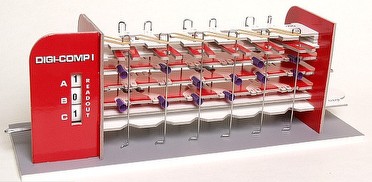
Posted on 03/25/2011 12:18:04 PM PDT by LibWhacker
Two recent developments—a plastic processor and printed memory—show that computing doesn't have to rely on inflexible silicon.
Silicon may underpin the computers that surround us, but the rigid inflexibility of the semiconductor means it cannot reach everywhere. The first computer processor and memory chips made out of plastic semiconductors suggest that, someday, nowhere will be out of bounds for computer power.
Researchers in Europe used 4,000 plastic, or organic, transistors to create the plastic microprocessor, which measures roughly two centimeters square and is built on top of flexible plastic foil. "Compared to using silicon, this has the advantage of lower price and that it can be flexible," says Jan Genoe at the IMEC nanotechnology center in Leuven, Belgium. Genoe and IMEC colleagues worked with researchers at the TNO research organization and display company Polymer Vision, both in the Netherlands.
The processor can so far run only one simple program of 16 instructions. The commands are hardcoded into a second foil etched with plastic circuits that can be connected to the processor to "load" the program. This allows the processor to calculate a running average of an incoming signal, something that a chip involved in processing the signal from a sensor might do, says Genoe. The chip runs at a speed of six hertz-on the order of a million times slower than a modern desktop machine-and can only process information in eight-bit chunks at most, compared to 128 bits for modern computer processors.
Organic transistors have already been used in certain LED displays and RFID tags, but have not been used to make a processor of any kind. The microprocessor was presented at the ISSCC conference in San Jose, California, last month. Advertisement
Making the processor begins with a 25-micrometer thick sheet of flexible plastic, "like what you might wrap your lunch with," says Genoe. A layer of gold electrodes are deposited on top, followed by an insulating layer of plastic, another layer of gold electrodes and the plastic semiconductors that make up the processor's 4,000 transistors. Those transistors were made by spinning the plastic foil to spread a drop of organic liquid into a thin, even layer. When the foil is heated gently the liquid converts into solid pentacene, a commonly used organic semiconductor. The different layers were then etched using photolithography to make the final pattern for transistors.
In the future, such processors could be made more cheaply by printing the organic components like ink, says Genoe. "There are research groups working on roll-to-roll or sheet-to-sheet printing," he says, "but there is still some progress needed to make organic transistors at small sizes that aren't wobbly," meaning physically irregular. The best lab-scale printing methods so far can only deliver reliable transistors in the tens of micrometers, he says.
Creating a processor made from plastic transistors was a challenge, because unlike those made from ordered silicon crystals, not every one can be trusted to behave like any other. Plastic transistors each behave slightly differently because they are made up of jumbled, amorphous collections of pentacene crystals. "You won't have two that are equal," says Geneo. "We had to study and simulate that variability to work out a design with the highest chance of behaving correctly."
The team succeeded, but that doesn't mean the stage is set for plastic processors to displace silicon ones in consumer computers. "Organic materials fundamentally limit the speed of operation," Genoe explains. He expects plastic processors to appear in places where silicon is barred by its cost or physical inflexibility. The lower cost of the organic materials used compared to conventional silicon should make the plastic approach around 10 times cheaper.
"You can imagine an organic gas sensor wrapped around a gas pipe to report on any leaks with a flexible microprocessor to clean up the noisy signal," he says. Plastic electronics could also allow disposable interactive displays to be built into packaging, for example for food, says Genoe. "You might press a button to have it add up the calories in the cookies you ate," he says.
I worked on a tape automated bonding line in the 80’s.
We made huge semiconductor units on what was essentially 35mm camera film.
The chinese have no doubt advanced this technology, seeing as there were just too many chemicals involved in the process for American sensibilities to permit profitability.
ping

Imagine a smart debit card that can display the amount left in your account with a push of your thumbprint, powered by light. It's not far off with organic semiconductor technology.
I was a young steveo once meself - and had one of these to boot! ;-)
Disclaimer: Opinions posted on Free Republic are those of the individual posters and do not necessarily represent the opinion of Free Republic or its management. All materials posted herein are protected by copyright law and the exemption for fair use of copyrighted works.